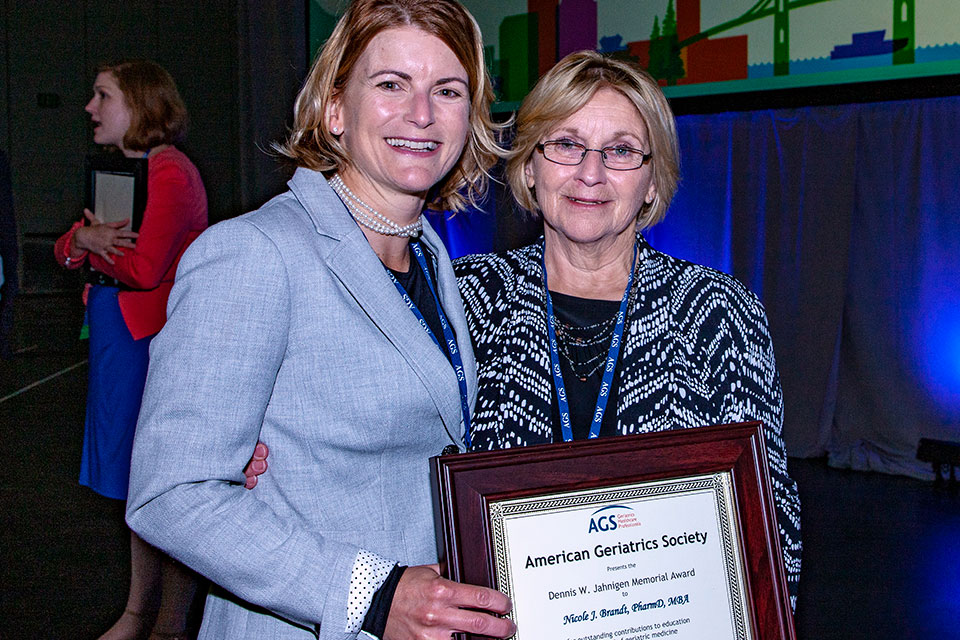Lamy Center to Lead Statewide Antimicrobial Stewardship Initiative
Maryland Department of Health awards the Lamy Center a $200,000 contract to help promote appropriate antimicrobial use in long-term care and nursing facilities across the state.

By Malissa Carroll
September 11, 2018
The Peter Lamy Center on Drug Therapy and Aging at the University of Maryland School of Pharmacy has been awarded a $200,000 contract from the Maryland Department of Health to promote appropriate antimicrobial use in long-term care and nursing facilities across the state of Maryland. Nicole Brandt, PharmD, MBA, BCPP, CGP, FASCP, professor in the Department of Pharmacy Practice and Science (PPS) and executive director of the Lamy Center, will serve as the principal investigator for the contract, which ultimately aims to establish a training program focused on antimicrobial stewardship and infection control for consultant pharmacists and other medical providers working in long-term care settings across the state.
“One of the most effective ways to help curb antimicrobial resistance is to train pharmacists — as the medication experts on the health care team — to educate, engage, and support antimicrobial stewardship programs,” says Brandt. “This specialized training is crucially needed across the state, particularly in long-term care settings, where many antibiotics are prescribed inappropriately or unnecessarily. Our team of consultant pharmacists at the Lamy Center has extensive experience practicing in this unique care setting, and we are thrilled to partner with the Maryland Department of Health to help promote appropriate antimicrobial use and improve health outcomes for patients in the state’s long-term care facilities.”
Antimicrobial stewardship programs aim to measure and improve the appropriate use of antimicrobials (antibiotics). These programs are designed to help health care professionals achieve better outcomes for their patients by providing guidance on the selection, dose, duration, and administration of an optimal antimicrobial drug regimen.
The Centers for Medicare and Medicaid Services (CMS) now requires that all of its participating long-term care facilities, including those in the state of Maryland, have an antimicrobial stewardship program that incorporates protocols and monitoring for antimicrobial use. Through its contract with the Maryland Department of Health, the Lamy Center will partner with health officials across the state to develop new programs, trainings, and other educational opportunities that promote antimicrobial stewardship among health care professionals and help those professionals meet the guidelines established by CMS for their specialized facilities.
“Although national organizations have developed guidelines and tools for antimicrobial stewardship, there remains a need to translate those tools into actionable, measurable, and impactful programs that are tailored to the unique needs of long-term care facilities in Maryland,” says Brandt. “As a hub of information and research for pharmacists and other health care professionals interested in geriatrics and gerontology issues, the Lamy Center is well-positioned to assist in this endeavor and help improve the lives of the older adults receiving care in these facilities.”
The antimicrobial stewardship program designed by the Lamy Center will include four elements. The first is an antimicrobial stewardship summit, which is scheduled for Sept. 14 at the LifeSpan Network-Handelman Conference Center in Columbia, Md., and will provide health care professionals with an overview of the Centers for Disease Control and Prevention’s (CDC) “Core Elements of Antibiotic Stewardship in Long-Term Care Facilities” and introduce the Lamy Center’s new Maryland Train-the-Trainer Program for consultant pharmacists practicing in long-term care facilities.
Targeted education interventions for consultant pharmacists and other health care professionals who work directly with long-term care providers and families encompass the program’s second element. These interventions will focus on asymptomatic bacteriuria and urinary tract infections, which are among the most common infections for which antimicrobials are prescribed for patients in long-term care facilities, and understanding the development and interpretation of antibiograms – specialized reports that aid health care providers in choosing appropriate antimicrobial therapies based on local susceptibility patterns.
The third and fourth elements of the Lamy Center’s antimicrobial stewardship program include a patient safety toolkit to be developed in partnership with health care application developer Think Research, and marketing and engagement activities to further increase awareness and involvement of antimicrobial stewardship among long-term care providers, respectively.
“Faculty at the University of Maryland School of Pharmacy have extensive and longstanding expertise developing cutting-edge educational training initiatives for both pharmacists and other health care professionals,” says Richard B. Brooks, MD, MPH, chief of the Office of Antimicrobial Resistance and Healthcare Associated Infection Response at the Maryland Department of Health. “The Lamy Center’s dedication to pharmacy issues unique to the geriatric patient, combined with Dr. Brandt’s extensive expertise in the field of long-term care pharmacy, make this an ideal partnership for our organization. We look forward to working with Dr. Brandt and her team on this project and are excited for this opportunity to promote antimicrobial stewardship across the state’s more than 200 long-term care facilities.”



